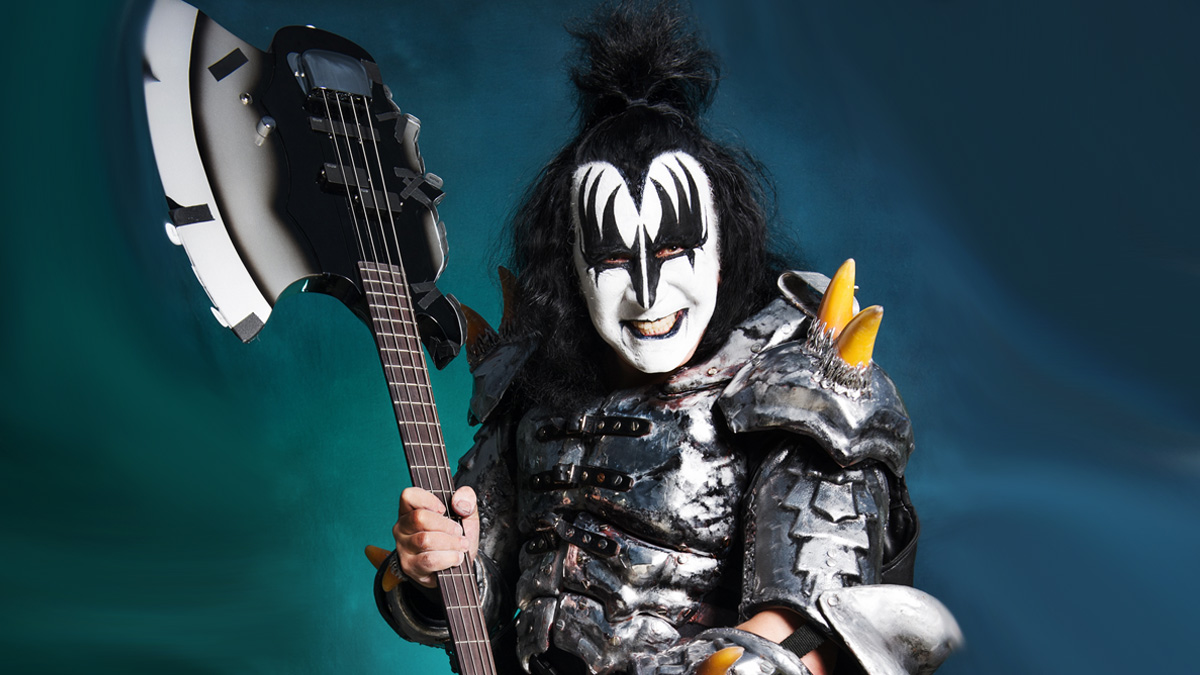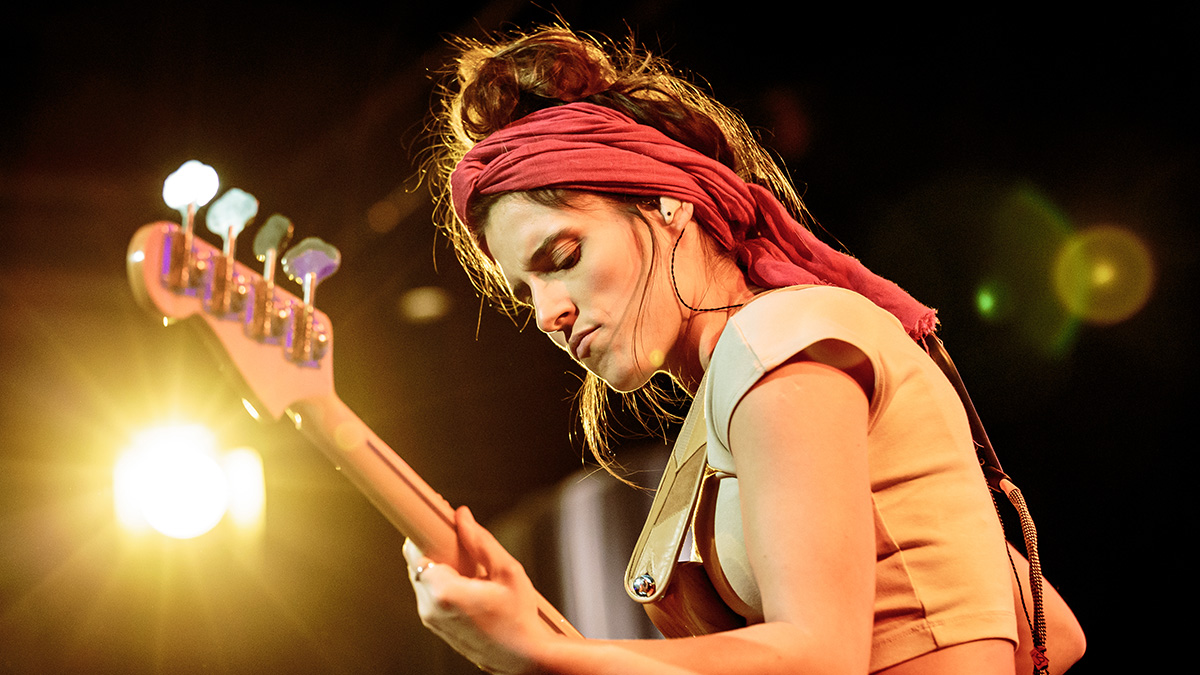Gene Simmons: "Many guitarists call their instruments 'axes', but nobody trademarked it. Except this guy!"
The fire-breathing Kiss frontman and bassist on being the hardest working, hardest rocking band in the business

All the latest guitar news, interviews, lessons, reviews, deals and more, direct to your inbox!
You are now subscribed
Your newsletter sign-up was successful
Gene Simmons’ activities outside the scope of music - his womanizing, his love of money, his reality TV shows and various minor controversies - has often overshadowed the fact that, first and foremost, he is a musician in one of the world’s biggest rock bands.
It might explain why Gene isn’t always given the bass props he deserves, despite being one of the exponent’s most famous players. His skill is certainly evident on Kiss’ recordings, particularly in the early days on tracks such as Goin’ Blind, Black Diamond or 100,000 Years.
His style is a little unconventional for some, playing solely with a pick, but, as drummer Eric Singer stated before the interview started, “Gene’s on the fucking money. I’ve played with the very best - and Gene is up there with all of them”.
Given Eric’s CV, that’s high praise indeed. Kiss are currently embarked on their final tour - not to be confused with their farewell tour of 2001 - and I find myself backstage at London’s O2 Arena, marveling at the sheer scale of the stage production being put into place by the crew, before finally being introduced to the man himself. The first thing to note is his presence.
Not just his size, he’s a big guy even without the platforms, but the way he effortlessly commands the room. He’s clearly a man comfortable being the centre of attention, teasing the various members of crew and attendant venue staff with a roguish charm.
He immediately makes fun of my posh accent, launching into a fairly mangled impersonation, before picking up a piece of bread and waving it at me, saying “I can’t touch this stuff, can you believe that? I have to stay away from the bad stuff... I can’t eat all the stuff I like any more.”
Were it not for McCartney, I would never have understood that the bass didn’t just have to hold down the bottom end like the great AC/DC, and it didn’t have to be funky like Motown
So, Gene, it’s your final show in London tonight.
All the latest guitar news, interviews, lessons, reviews, deals and more, direct to your inbox!
"That’s not necessarily so. It’s our last show at the O2 Arena. Ever. This is a long tour. We’re going back to America and we’re playing for the final time at whatever venue we’re playing."
On the Kiss website, the last show listed is in Japan.
"Nobody knows anything except for us. We are the be-all and end-all. It would be nice to come back to do Hyde Park, maybe a free concert? I don’t know. I’m 70 now, and I still look fantastic by the way, but there are bands who stay on stage far too long. That’s their cross to bear - I’m Jewish, see what I did there?
"The other thing is that we’re the hardest-working band out there. If you talk to any girl who wears high heels for two hours then she’ll tell you how her back feels. We’re on eight-inch platform heels, so imagine walking around with bowling balls connected to your legs. They’re heavy!"
What’s your fondest memory of the UK?
"Well, you have a great tradition of royals and all that, but to me, the British thing that changed the world was the Beatles (pronounced “Beat-awws”), who, despite what anyone would suspect, didn’t come from London, didn’t go to music school or art school or anything like that. They created something that even Elvis couldn’t imagine. He was perhaps the greatest rocker on stage, but couldn’t write a song if they held a gun to his head."
You don’t think Elvis changed the cultural landscape in the same way as the Beatles?
"No he did not, because you didn’t want to dress like Elvis, particularly in middle America. You wanted to grow your hair, this kind of unisex thing. Guys and girls would have the same haircut. Then the Grateful Dead took it to extreme lengths and started to look like bums. The British always had the glamour - the high style."
As a young musician, did you look to Britain as your main influence?
"We were major Anglophiles. If anything, I used to talk like that, you know, where everything sounds like a question? (Attempts Liverpool accent) ‘I work moi fingers to the bone aww day’; all that. Britain was the thing, and it wasn’t the royals. It was the Beatles, the Scouse and the more ‘poor’ sounding English."
Why stop Kiss now?
"I’m 70, and by the time we stop I’ll be 72 or 73. It will be the right time. (Points to Eric Singer) He’s going to turn 12. Actually, how old do you think Eric is?"
Umm... late forties?
Eric: "I wish! I’m 61. But if you stop you’ll die. You stop working and you get old real quick. Motion cures emotion. And that’s how I believe Gene stays in such good shape. You learn from the examples around you, and I see that people who stay busy and work hard, they tend to that everybody wanted to be the lead singer too. Drums were out of the question because of where I was living, but very few people actually wanted to play the bass. McCartney had the same thing."
The Axe bass came about because, as I said, I noticed that the musicians were calling their instruments axes, so, freehand, I designed it and had one made, like a literal axe
Was McCartney an influence on bass?
"I didn’t think of it like that, but once I’d picked up the instrument I understood where A and G and F were because it was the same layout as a standard guitar. My mother was very sweet and bought me a Gibson SG Standard, a very decent guitar to start with. I had to play it acoustically as I didn’t own an amplifier, but I started writing songs with that.
"It was a different style back then, inspired by Lindisfarne, very picky and folky, aimless melodies with no hooks or choruses. Which is why they didn’t become a big band... But clearly were it not for McCartney, I would never have understood that the bass didn’t just have to hold down the bottom end like the great AC/DC, and it didn’t have to be funky like Motown.
"I found there was another thing, almost like a string quartet, where the cello has its own melody against the rest of the instruments. McCartney’s bassline in Michelle; it’s classical. Classical bass playing is pivotal in the way that he approached it, and that’s possibly because he wasn’t originally a bass player. He used it as a melodic instrument rather than as a rhythm instrument tied to the drums."
Some of the best bass players started as guitar players, Carol Kaye for instance.
"Oh my God, she taught me so much. Have you seen the clip on YouTube? She’s sitting in front of me, and I’m just such a huge fan. She’s a short, blonde Jewish woman who came up with bass-lines for my former girlfriend Cher that are instantly recognizable to this day (sings The Beat Goes On bassline). That wasn’t Sonny, that was her. Sonny played her the song and she told him it needed something more."
Talk us through your lesson with Carol.
"Carol Kaye is in front of me and I ask her to play Bernadette by the Four Tops, and she starts playing it. I know how to play it so I say ‘Yeah, I could do that’, like an arrogant asshole. I played the notes and she said, ‘No, that’s completely wrong’.
"I asked if I played the wrong notes and she said that I played the right notes, but it had no feeling, no bounce and it didn’t have soul. She said that it’s not just the notes, it’s the inference, the placement. The great rappers, as they’re talking, you can feel the rhythm and where it lands."
Can you play slap bass?
"I don’t like it. I’ve never liked it. It feels self-aggrandized. Sly & the Family Stone, great band, but I never liked the slap. It only belongs with funk, but I’m fussy - I like funk with melody, Stevie Wonder’s style of funk. But it’s all about taste. Some people like the Brothers Johnson and Chick Corea, but for me the slap just gets in the way of the song. It’s called slap because someone comes across the stage, slaps you in the face then runs away!"
In the early days you played Gibsons, for the first couple of Kiss albums at least.
"Actually my very first bass I had built was one, because I didn’t like the way that most standard bass guitars were neck-heavy, and I couldn’t do my Jesus Christ pose. Also, I like to slide up the neck after a line in a song, and with the Fenders the bodies came right into the neck, so I designed my own basses from the very beginning.
"The first one was made by a guy called Charlie LoBue, and it lasted about a year and a half until it died. Then the Spectors came, a guy called Stuart Spector. The very first Spector bass was made for me. I used Gibsons for a short time, but mostly it’s been basses that I designed and had made for myself."
The Punisher was initially built by BC Rich, right?
"For a very short time, yes. I trademarked it and had it built in South Korea by a very good company. The highest quality wood, and all one piece throughout. No bolt-on, nothing. That meant that a number of the basses had to be thrown out, because I didn’t want to deal with any curvature of the neck. Then, of course, Marvel sued me because they had a character called the Punisher, but I won.
"The Axe bass came about because, as I said, I noticed that the musicians were calling their instruments axes, so, freehand, I designed it and had one made, like a literal axe. It looked cool to me, I could swing it like an axe on stage and all of that. It’s not just trademarked as a name, but the body type is also trademarked as an invention. It qualified because form follows function - it’s an invention."
So it’ll never be like a Les Paul shape that anyone can build and copy?
"That was stupid on Les Paul and Fender’s parts. They never trademarked it. You know what they did trademark? The headstock. Who gives a fuck about the headstock? Schecter, Yamaha, everyone, can use the Fender bodies and not pay them anything. It shows that they didn’t understand trademark laws. When I think of Gibsons and Fenders I think of those classic body shapes."
This business savvy does seem to set you apart from the generalized view of the rock star.
"Well, there’s no excuse - because all the information is free. It’s not just me, but people like Mick Jagger too. Mick has a degree from the London School of Economics. I love Keith, but if the Stones were run on his business model...
"To this day I design and manufacture my own basses, the Axe and the Punisher. Ironically enough musicians, and jazz musicians especially, they call their musical instruments 'axes', but nobody trademarked it. Except this guy sitting in front of you right now!"
Kiss's Kissworld is out now on Mercury.
